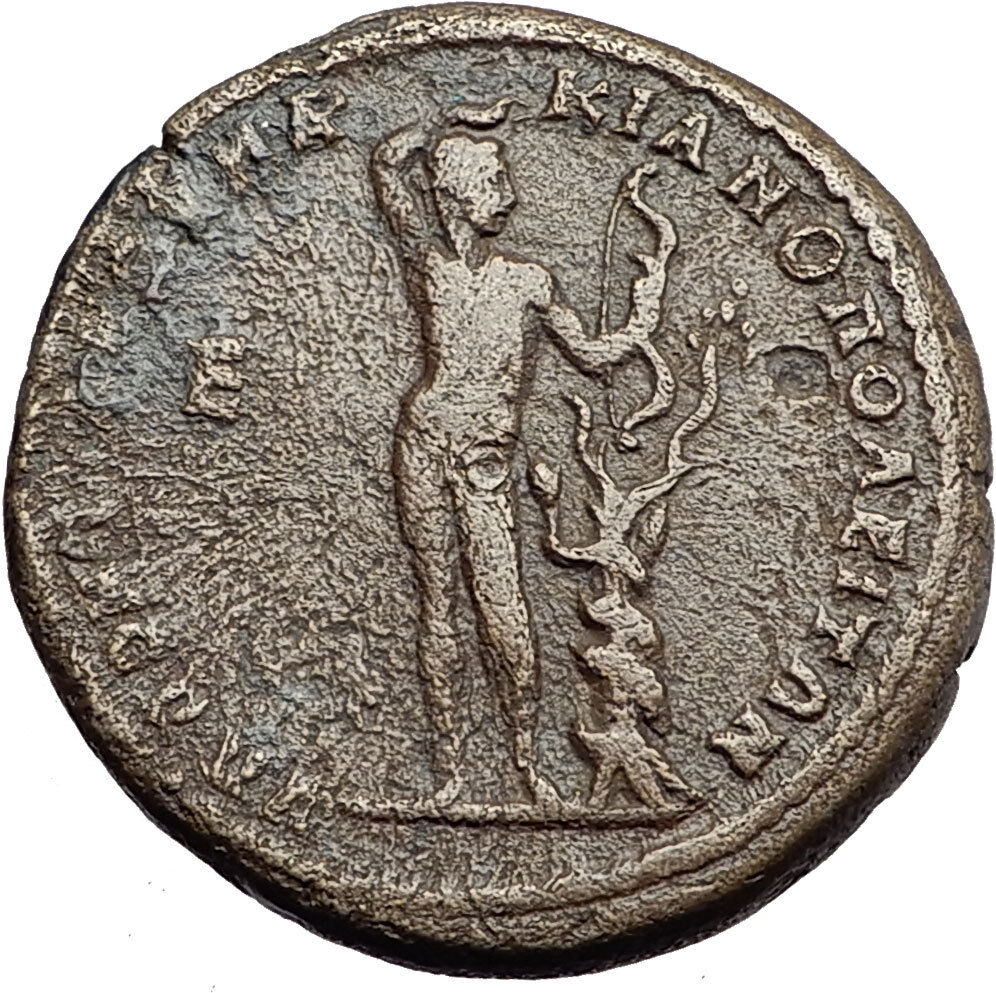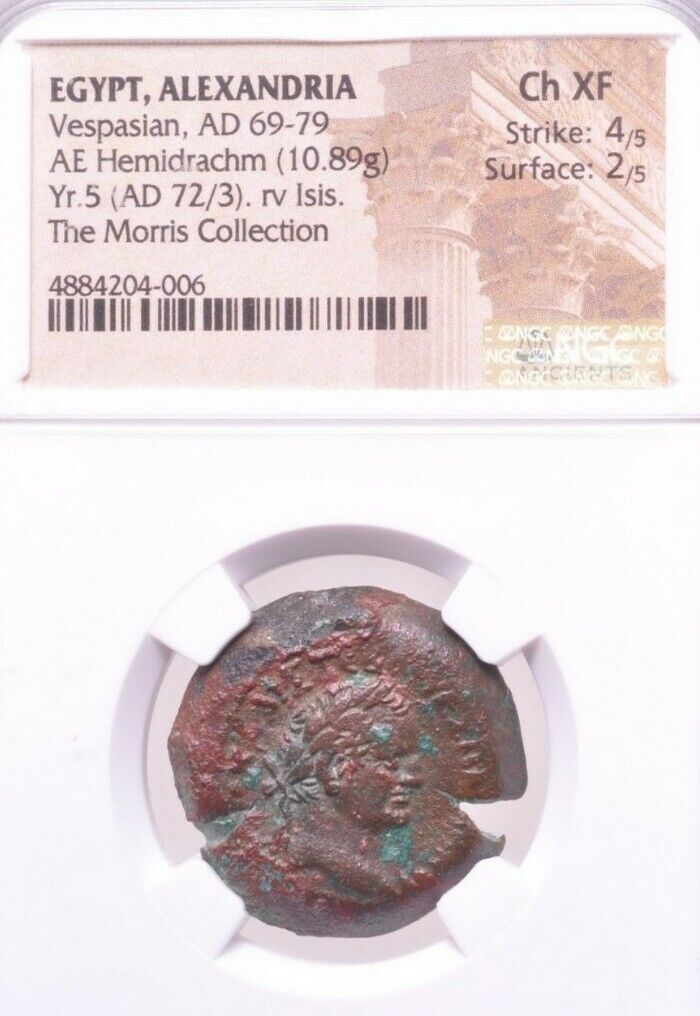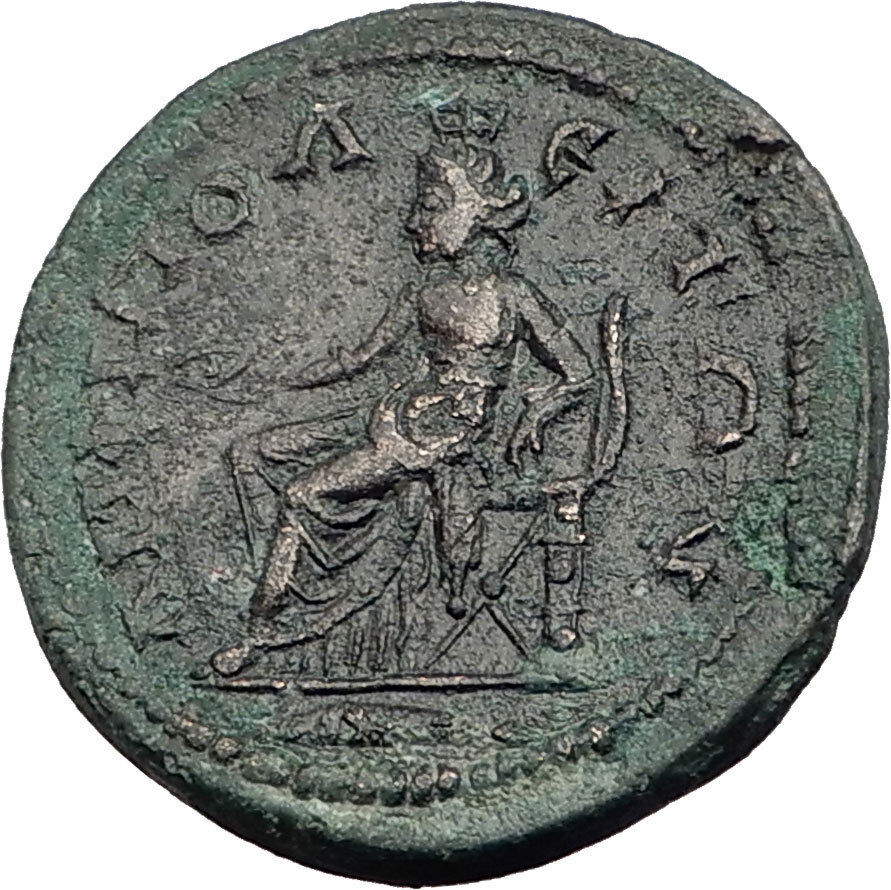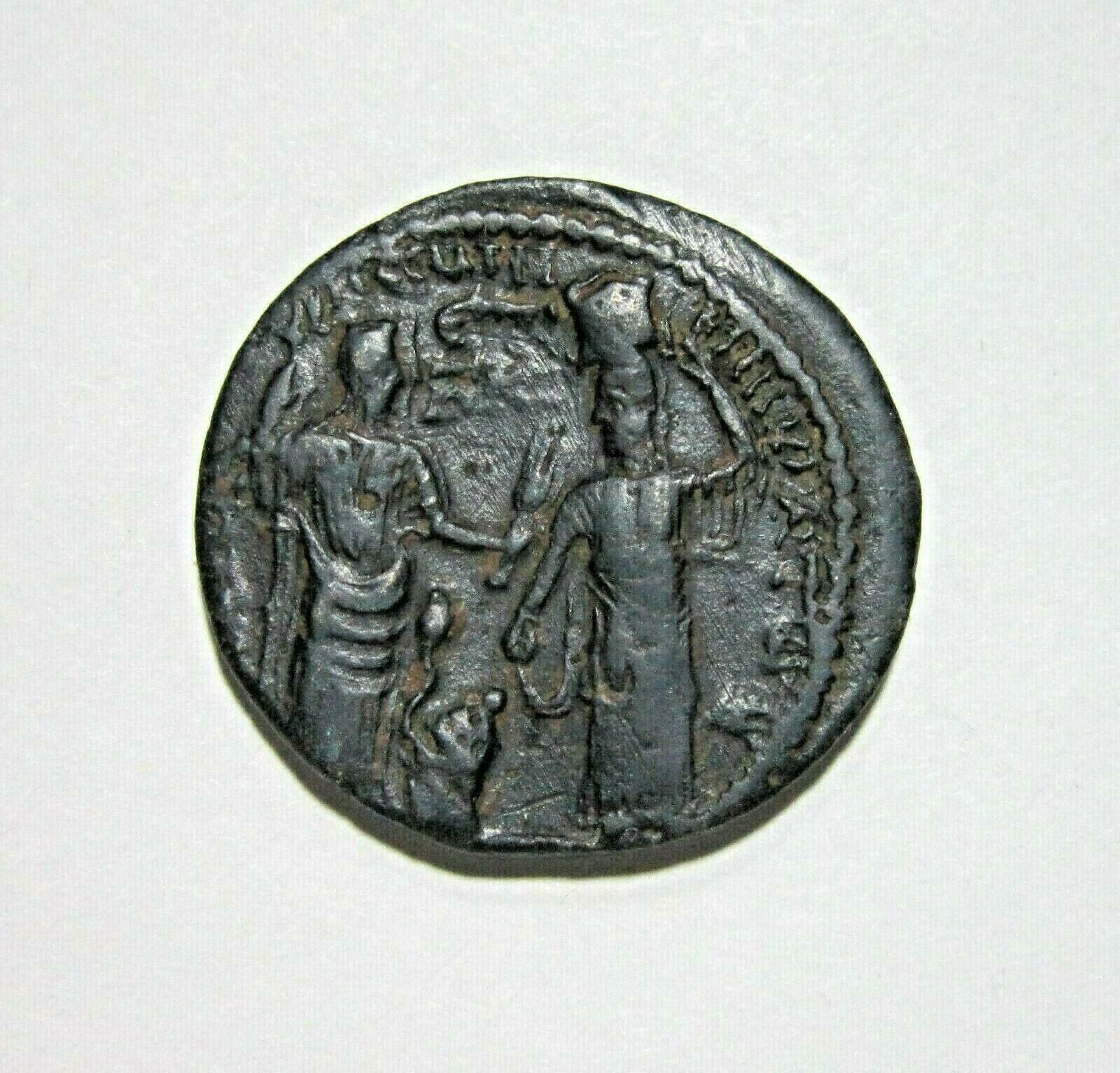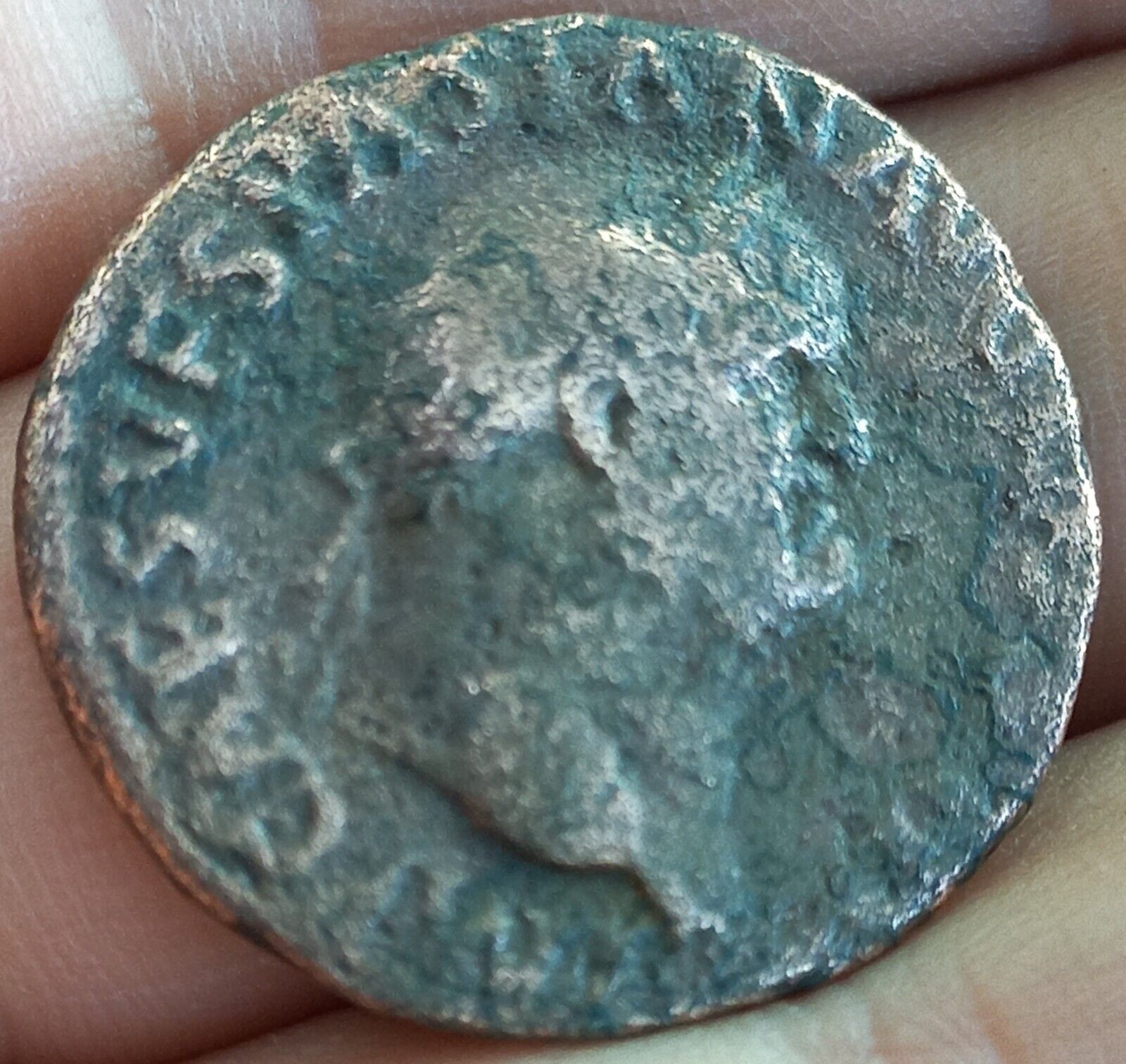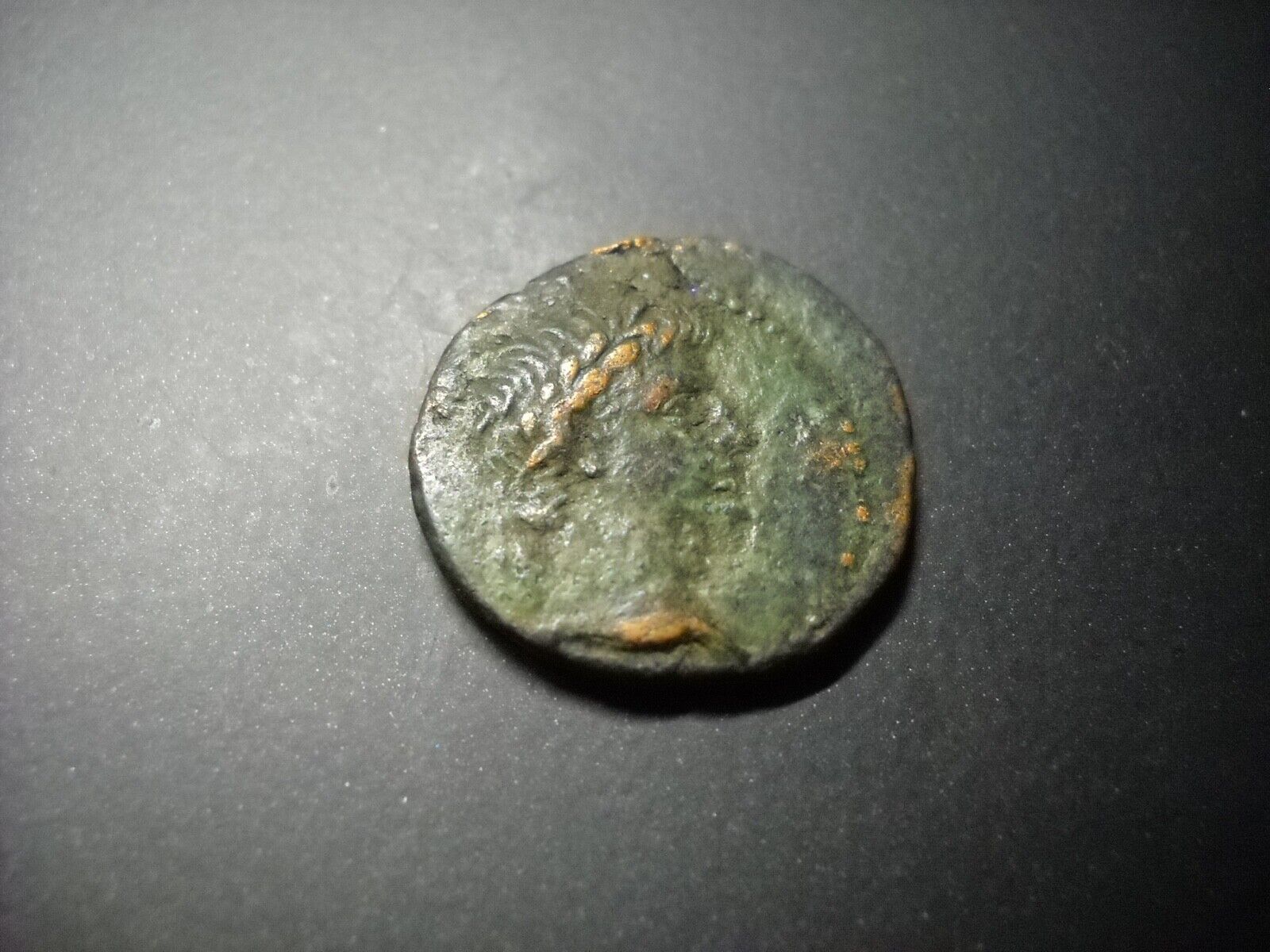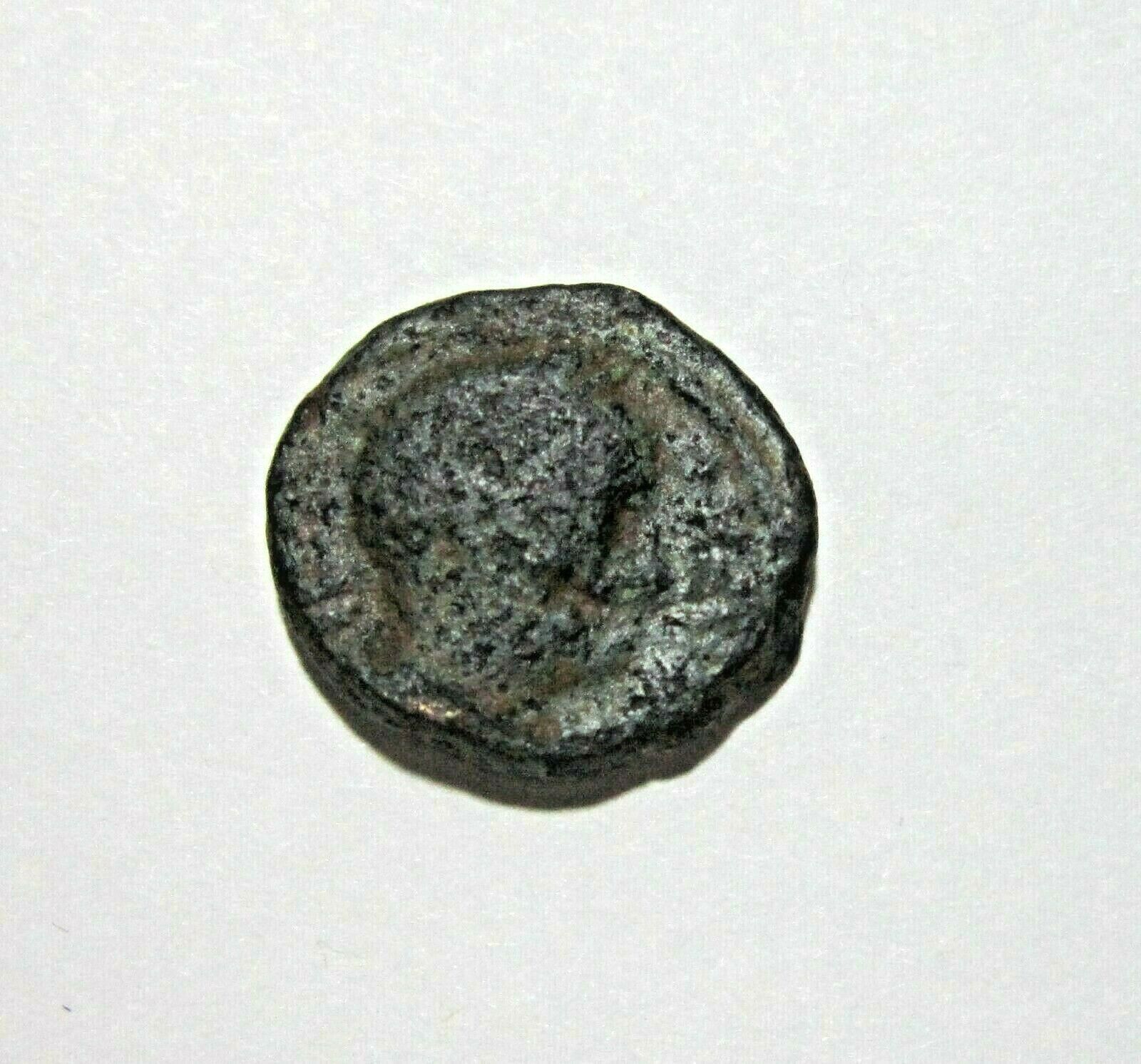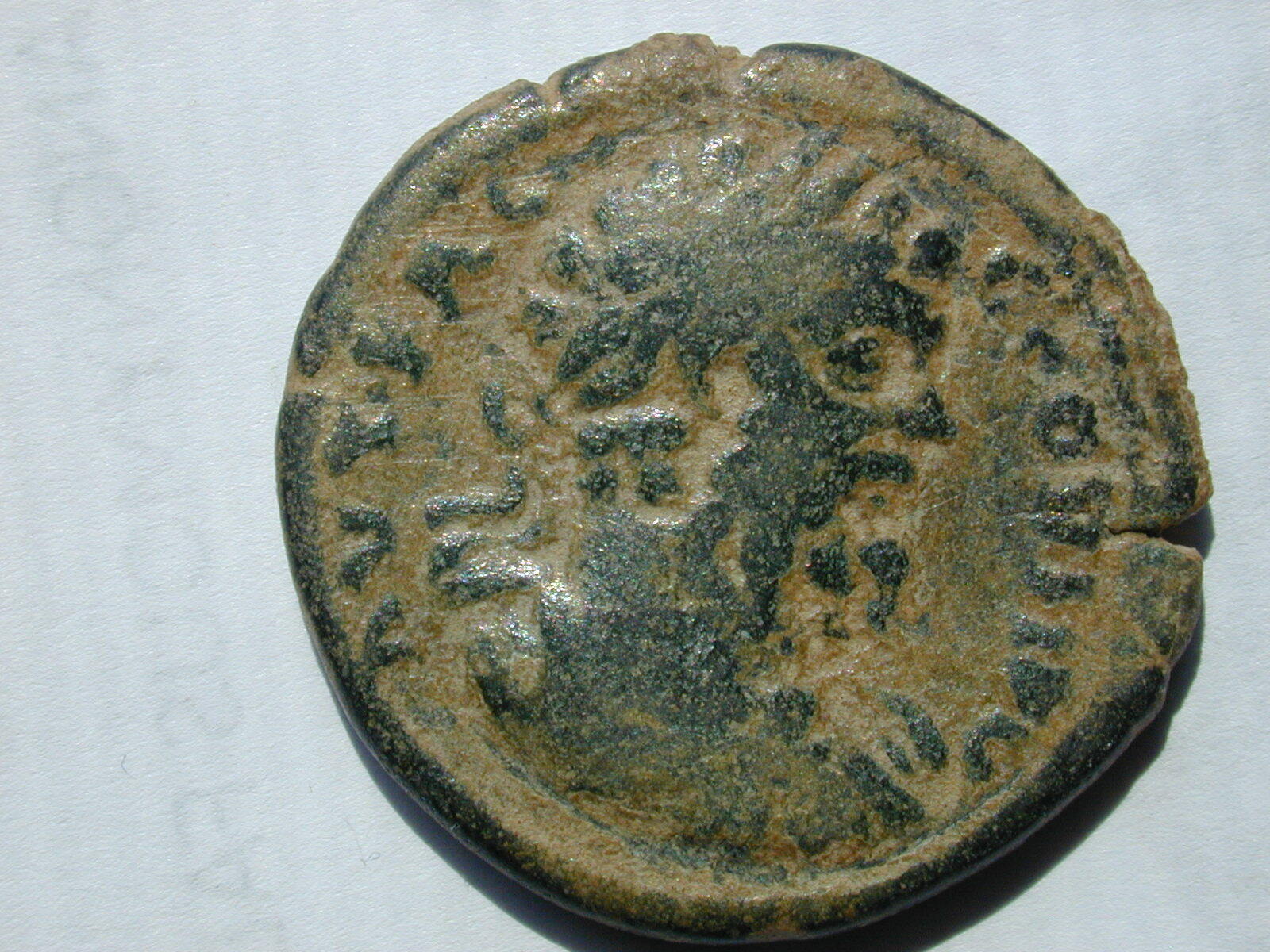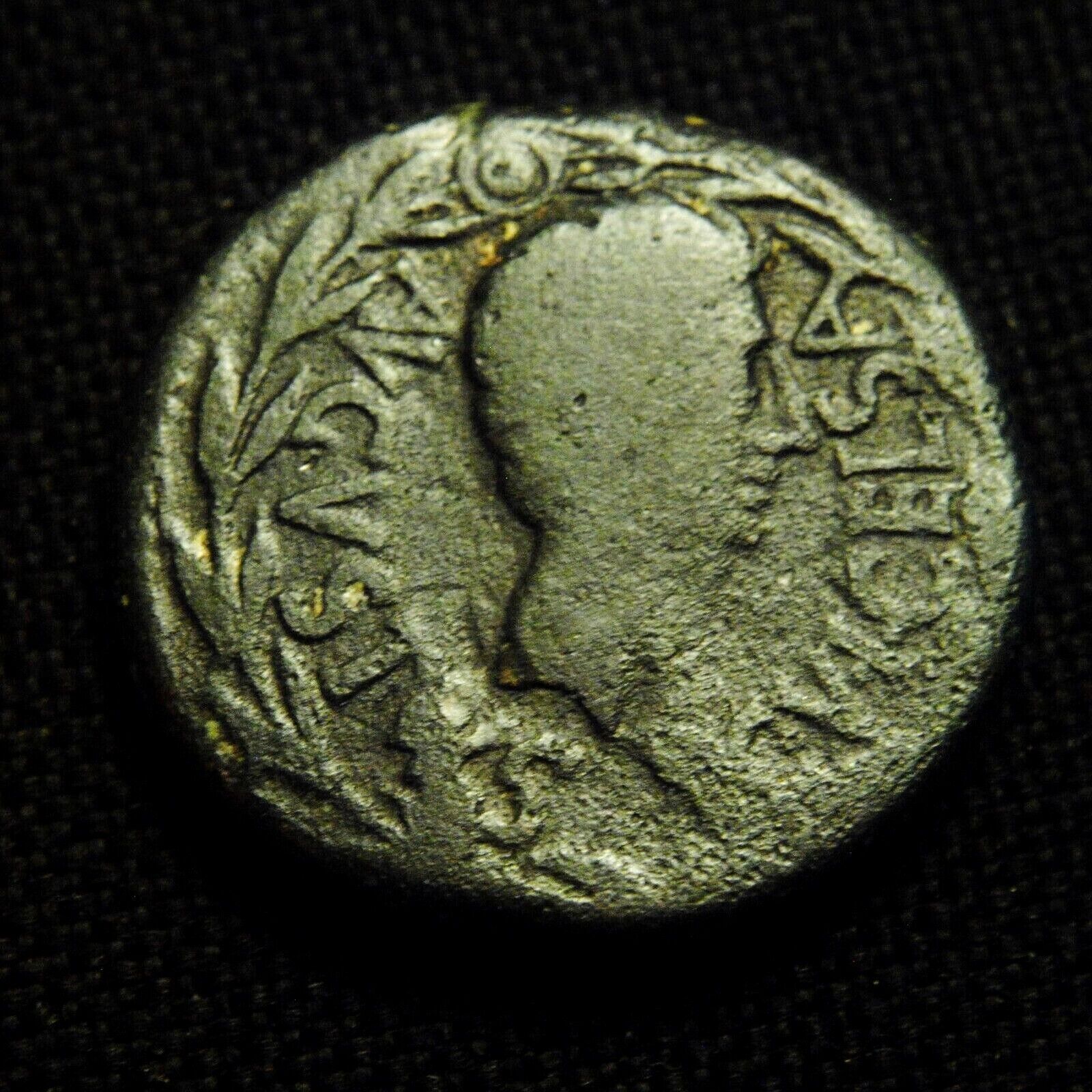-40%
MACRINUS & DIADUMENIAN 217AD Marcianopolis APOLLO BOW SERPENT Roman Coin i57902
$ 158.4
- Description
- Size Guide
Description
Item:i57902
Authentic Ancient Coin of:
Macrinus
-
Roman Emperor
: 217-218 A.D.
Macrinus and His Son Diadumenian
Bronze 27mm (12.60 grams) of
<="" font="" face="Times New Roman">Marcianopolis in Moesia Inferior under Legate Furius Pontianus="">
AVT K OΠEΛΛI CEV MAKPEINOC K M OΠEΛΛI ANTΩNEINOC, Laureate, draped and cuirassed bust of Macrinus on left facing right toward draped bust of Diadumenian facing left on right.
VΠ ΠONTIANOV MAPKIANOΠOΛITΩN, Nude Apollo standing, head right, holding bow; serpent entwined around tree on right, E in field to left.
You are bidding on the exact item pictured, provided with a Certificate of Authenticity and Lifetime Guarantee of Authenticity.
In
Greek
and
Roman mythology
,
Apollo
, is one of the most important and diverse of the
Olympian deities
. The ideal of the
kouros
(a beardless youth), Apollo has been variously recognized as a god of light and the sun; truth and prophecy;
archery
; medicine and healing; music, poetry, and the arts; and more. Apollo is the son of
Zeus
and
Leto
, and has a
twin
sister, the chaste huntress
Artemis
. Apollo is known in Greek-influenced
Etruscan mythology
as
Apulu
. Apollo was worshiped in both
ancient Greek
and
Roman religion
, as well as in the modern
Greco
-
Roman
Neopaganism
.
As the patron of
Delphi
(
Pythian Apollo
), Apollo was an
oracular
god — the prophetic deity of the
Delphic Oracle
. Medicine and healing were associated with Apollo, whether through the god himself or mediated through his son
Asclepius
, yet Apollo was also seen as a god who could bring ill-health and deadly
plague
as well as one who had the ability to cure. Amongst the god's custodial charges, Apollo became associated with dominion over
colonists
, and as the patron defender of herds and flocks. As the leader of the
Muses
(
Apollon Musagetes
) and director of their choir, Apollo functioned as the patron god of music and
poetry
.
Hermes
created the
lyre
for him, and the instrument became a common
attribute
of Apollo. Hymns sung to Apollo were called
paeans
.
In Hellenistic times, especially during the third century BCE, as
Apollo Helios
he became identified among Greeks with
Helios
,
god of the sun
, and his sister Artemis similarly equated with
Selene
,
goddess of the moon
. In Latin texts, on the other hand, Joseph Fontenrose declared himself unable to find any conflation of Apollo with
Sol
among the
Augustan poets
of the first century, not even in the conjurations of
Aeneas
and
Latinus
in
Aeneid
XII (161–215). Apollo and Helios/Sol remained separate beings in literary and mythological texts until the third century CE.
Marcianopolis
, or
Marcianople
was an ancient Roman city in
Thracia
. It was located at the site of modern day
Devnya
,
Bulgaria
.
The city was so renamed by Emperor
Trajan
after his sister
Ulpia Marciana
, and was previously known as Parthenopolis. Romans repulsed a
Gothic
attack to this town in
267
(or
268
), during the reign of
Gallienus
.
Diocletian
made it the capital of the
Moesia Secunda
province.
Valens
made it his winter quarters in 368 and succeeding years, Emperor
Justinian I
restored and fortified it. In 587, it was sacked by the king of the
Avars
but at once retaken by the Romans. The Roman army quartered there in 596 before crossing the Danube to assault the Avars.
Between 893 and 972 it was one of the most important medieval cities in south-eastern Europe.
Marcus Opellius Antoninus Diadumenianus
or
Diadumenian
(208–218) was the son of the Roman Emperor Macrinus, and served his father briefly as Caesar (May 217–218) and as Augustus (in 218). Diadumenian was born in 14th of September 208 a.C or according to Historia Augusta in 19th of September 208 a.C because he shared the same birthday with the emperor Antoninus Pius. His mother was Empress Nonia Celsa, although her existence remains dubious, because she was only mentioned by the Historia Augusta. He was born Marcus Opellius Diadumenianus, but his name was changed and added Antoninus to solidify connection to the family of Marcus Aurelius as done by Caracalla.
Diadumenian had little time to enjoy his position or to learn anything from its opportunities because the legions of Syria revolted and declared Elagabalus ruler of the Roman Empire. When Macrinus was defeated on June 8, 218, at Antioch, Diadumenian followed his father's death.
Marcus Opellius Macrinus
(ca. 165 - June 218) was
Roman
emperor
for fourteen months in 217 and 218. Macrinus was the first emperor to become so without membership in the senatorial class. Macrinus was possibly of
Berber
descent.
//
Background and career
Born in Caesarea (modern
Cherchell
, Algeria) in the
Roman province
of
Mauretania
to an
equestrian
family, Macrinus received an education which allowed him to ascend to the Roman political class. Over the years he earned a reputation as a skilled lawyer. Under the emperor
Septimius Severus
he became an important bureaucrat. Severus' successor
Caracalla
appointed him
prefect
of the
Praetorian guard
. While Macrinus likely enjoyed the trust of Caracalla, this may have changed when, according to tradition, he was prophesied to depose and succeed the emperor. Rumors spread regarding Macrinus' alleged desire to take the throne for himself. Given Caracalla's tendency towards murdering political opponents, Macrinus probably feared for his own safety should the emperor become aware of this prophecy. According to Dio, Caracalla had already taken the step of re-assigning members of Macrinus' staff.
In the spring of 217, Caracalla was in the eastern provinces preparing a campaign against the
Parthian Empire
. Macrinus was among his staff, as were other members of the praetorian guard. In April, the emperor went to visit a temple of
Luna
near the spot of the
battle of Carrhae
, accompanied only by his personal bodyguard, which included Macrinus. Events are not clear, but it is certain that Caracalla was murdered at some point on the trip (perhaps on
April 8
). Caracalla's body was brought back from the temple by his bodyguards, along with the corpse of a fellow bodyguard. The story as told by Macrinus was that the dead guard had killed Caracalla. By
April 11
, Macrinus proclaimed himself emperor. Macrinus also nominated his son
Diadumenianus
Caesar
and successor and conferred upon him the name "Antoninus", thus connecting him with the relatively stable reigns of the
Antonine emperors
of the 2nd century.
Reign (April 217 - June 218)
Despite his equestrian background, Macrinus was confirmed in his new role by the
Senate
. According to S.N. Miller, this may have been due to both his background as an accomplished jurist and his deferential treatment of the senatorial class. He found it necessary, however, to replace several provincial governors with men of his own choosing. Caracalla's mother
Julia Domna
was initially left in peace, but when she started to conspire with the military he ordered her to leave
Antioch
. Being at that time in an advanced stage of breast cancer (Cassius Dio) she chose instead to starve herself to death.
In urgent matters of foreign policy, Macrinus displayed a tendency towards conciliation and a reluctance to engage in military conflict. He averted trouble in the province of
Dacia
by returning hostages that had been held by Caracalla, and he ended troubles in
Armenia
by granting that country's throne to
Tiridates
, whose father had also been imprisoned under Caracalla. Less easily managed was the problem of
Mesopotamia
, which had been invaded by the
Parthians
in the wake of Caracalla's demise. Meeting the Parthians in battle during the summer of 217, Macrinus achieved a
costly draw
near the town of
Nisibis
and as a result was forced to enter negotiations through which was obliged to pay the enormous
indemnity
of 200 million sesterces to the Parthian ruler
Artabanus IV
in return for peace.
Macrinus' reluctance to engage in warfare, and his failure to gain victory over even a historically inferior enemy such as the Parthians caused considerable resentment among the soldiers. This was compounded by the rolling back of the privileges they had enjoyed under Caracalla and the introduction of a pay system by which recruits received less than veterans. After only a short while, the legions were searching for a rival emperor.
At a high point of his popularity monuments were built to revere Macrinus. The grand
tetrastyle
Capitoline Temple
, in
Volubilis
was erected to honour Emperor Macrinus in 217 AD.
His popularity also suffered in Rome. Not only had the new emperor failed to visit the city after taking power, but a late-summer thunderstorm caused widespread fires and flooding, and Macrinus' appointee as urban prefect proved unable to repair the damage to the satisfaction of the populace and had to be replaced.
Downfall
This discontent was fostered by the surviving members of the
Severan dynasty
, headed by
Julia Maesa
(Caracalla's aunt) and her daughters
Julia Soaemias
and
Julia Mamaea
. Having been evicted from the imperial palace and ordered to return home by Macrinus, the Severan women plotted from their home near
Emesa
in
Syria
to place another Severan on the imperial throne. They used their hereditary influence over the cult of
sun-deity
Elagabalus (the Latinised form of
El-Gabal
) to proclaim Soaemias' son
Elagabalus
(named for his family's patron deity) as the true successor to Caracalla. The rumor was spread, with the assistance of the Severan women, that Elagabalus was in fact Caracalla's illegitimate son, and thus the child of a union between first cousins.
On
May 18
, Elagabalus was proclaimed emperor by the
Gallica
Legio III
at its camp at
Raphana
. A force under his tutor Gannys marched on
Antioch
and engaged a force under Macrinus on
June 8
,
218
. Macrinus, deserted by most of his soldiers, was soundly defeated in the
battle
, and fled towards Italy disguised as a courier. He was captured near
Chalcedon
and later executed in
Cappadocia
. His son Diadumenianus, sent for safety to the Parthian court, was captured at
Zeugma
and also put to death.
Macrinus' short reign, while important for its historical "firsts", was cut short due to the inability of this otherwise accomplished man to control or satisfy the soldiery. In his death at the hands of Roman soldiers, Macrinus reinforced the notion of the soldiers as the true brokers of power in the third-century empire and highlighted the importance of maintaining the support of this vital faction. His reign was followed by another seventeen years of rule under the Severan emperors
Elagabalus
and
Severus Alexander
.
Frequently Asked Questions
Mr. Ilya Zlobin, world-renowned expert numismatist, enthusiast, author and dealer in authentic ancient Greek, ancient Roman, ancient Byzantine, world coins & more.
Who am I dealing with?
You are dealing with Ilya Zlobin, ancient coin expert, enthusiast, author and dealer with an online store having a selection of over 15,000 items with great positive feedback from verified buyers and over 10 years experience dealing with over 57,000 ancient and world coins and artifacts. Ilya Zlobin is an independent individual who has a passion for coin collecting, research and understanding the importance of the historical context and significance all coins and objects represent. Most others are only concerned with selling you, Ilya Zlobin is most interested in educating you on the subject, and providing the largest selection, most professional presentation and service for the best long-term value for collectors worldwide creating returning patrons sharing in the passion of ancient and world coin collecting for a lifetime.
How long until my order is shipped?
Orders are shipped by the next business day (after receipt of payment) most of the time.
How will I know when the order was shipped?
After your order has shipped, you will be left positive feedback, and that date could be used as a basis of estimating an arrival date. Any tracking number would be found under your 'Purchase history' tab.
USPS First Class mail takes about 3-5 business days to arrive in the U.S. International shipping times cannot be estimated as they vary from country to country.
Standard international mail to many countries
does not
include a tracking number, and can also be slow sometimes.
For a tracking number and signature confirmation, you may want to do Express Mail International Shipping, which costs more, however, is the fastest and most secure. Additionally you may be able to receive your order in as little as 3-5 business days using this method. For Express Mail International, it may be possible to place up to 10-15 items in one package (for the one shipping cost) as it is flat rate envelope, which may be the most cost-effective, secure and fastest way to receive items internationally. Send me a message about this and I can update your invoice should you want this method.
Getting your order to you, quickly and securely is a top priority and is taken seriously here.
Great care is taken in packaging and mailing every item securely and quickly.
Please be aware, I cannot take responsibility for any postal service delivery delays, especially for international packages as it may happen in rare instances.
What is a certificate of authenticity and what guarantees do you give that the item is authentic?
Each of the items sold here, is provided with a Certificate of Authenticity, and a Lifetime Guarantee of Authenticity, issued by a world-renowned numismatic and antique expert that has identified over 57,000 ancient coins and has provided them with the same guarantee. You will be very happy with what you get with the COA; a professional presentation of the coin, with all of the relevant information and a picture of the coin you saw in the listing. Additionally, the coin is inside it's own protective coin flip (holder), with a 2x2 inch description of the coin matching the individual number on the COA.
On the free-market such a presentation alone, can be considered a - value all in itself, and it comes standard with your purchases from me,
FREE.
With every purchase, you are leveraging my many years of experience to get a more complete context and understanding of the piece of history you are getting. Whether your goal is to collect or give the item as a gift, coins presented like this could be more prized and valued higher than items that were not given such care and attention to.
Buy a coin today and own a piece of history, guaranteed.
Is there a money back guarantee?
I offer a 30 day unconditional money back guarantee. I stand behind my coins and would be willing to exchange your order for either store credit towards other coins, or refund, minus shipping expenses, within 30 days from the receipt of your order. My goal is to have the returning customers for a lifetime, and I am so sure in my coins, their authenticity, numismatic value and beauty, I can offer such a guarantee.
Is there a number I can call you with questions about my order?
You can contact me directly via ask seller a question and request my telephone number, or go to my About Me Page to get my contact information only in regards to items purchased on eBay.
When should I leave feedback?
Once you receive your order, please leave a positive feedback. Please don't leave any negative feedbacks, as it happens sometimes that people rush to leave feedback before letting sufficient time for their order to arrive. Also, if you sent an email, make sure to check for my reply in your messages before claiming that you didn't receive a response. The matter of fact is that any issues can be resolved, as reputation is most important to me. My goal is to provide superior products and quality of service.
How and where do I learn more about collecting ancient coins?
Visit the "Guide on How to Use My Store" for on an overview about using my store, with additional information and links to all other parts of my store which may include educational information on topics you are looking for.
You may also want to do a YouTube search for the term "ancient coin collecting" for educational videos on this topic.
